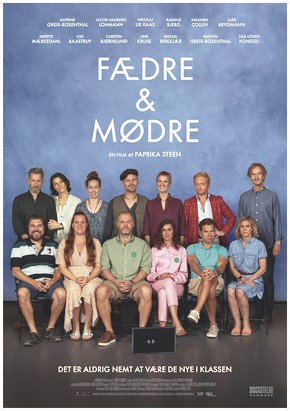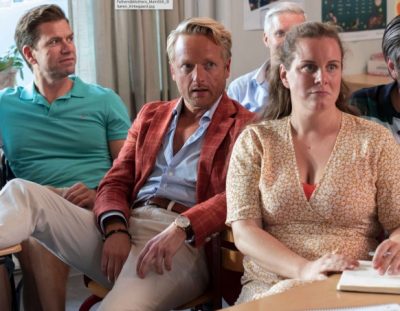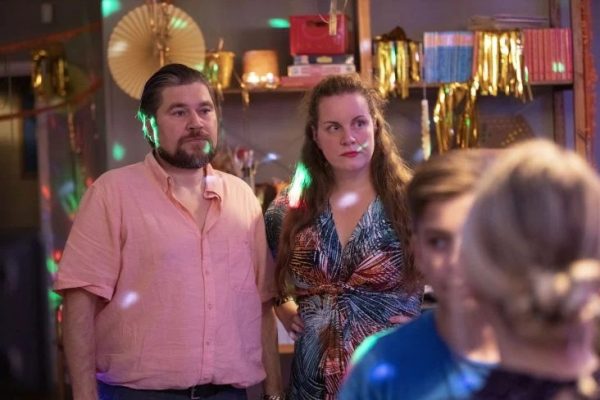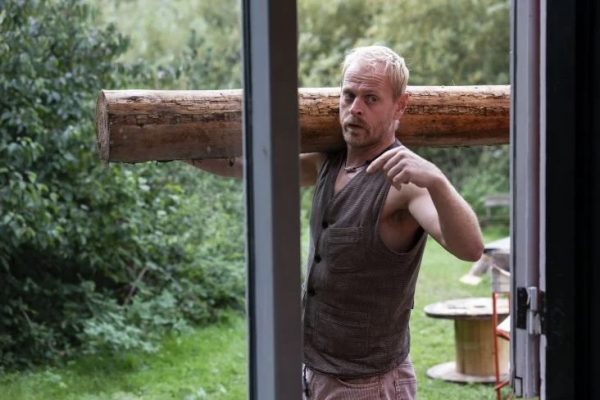‘Fathers and Mothers’ scrutinizes parents behaving badly

“Fathers and Mothers” (“Fædre og mødre”) (2022). Cast: Jacob Lohmann, Katrine Greis-Rosenthal, Ida Skelbæk-Knudsen, Victor Madsen, Rasmus Bjerg, Lise Baastrup, Lars Brygmann, Nikolaj Lie Kaas, Line Kruse, Carsten Bjørnlund, Amanda Collin, Martin Greis-Rosenthal, Merete Mærkedahl, Lisa Loven Kongsli, Mikhael Birkkjær. Director: Paprika Steen. Screenplay: Jakob Weis. Web site. Trailer.
Wanting the best for one’s children is a natural tendency for many parents. But how far is one willing to go to see this ambition realized? For some, this takes the form of supportive but restrained encouragement, a healthy approach, to be sure. But what happens when the push for success becomes an obsession, one driven by ever-escalating expectations that put undue pressure on the kids? Add to that the competitive one-upmanship that can emerge in an environment where parents and/or children are pitted against one another to come out on top as the alphas of the pack, and you’ve taken things to an entirely new level. And, if all that weren’t stressful enough, imagine what it might be like for everyone to compete to see who is the most politically correct of the bunch, steering matters to absurd degrees of pseudointellectual perfection. If you can picture that, you’ve got a pretty good idea of what it’s like to attend a private school designed to help students maximize their potential under the constantly hovering guidance of micromanaging adults, as seen in the new Danish satire, “Fathers and Mothers” (“Fædre og mødre”).
Ah, parents these days. They’re not what they used to be. They may operate from a place of good intentions where their children are concerned, but their common sense is often sorely lacking. They frequently imprint their own drive for success on their kids, pushing limits that were never meant to be exceeded with individuals possessing considerably less maturity and life experience. They may also push their purist, extremist ideologies too far with youngsters who are far too ill-equipped to deal with such notions. And, when they decide to let their hair down, they may engage in exercises in reckless abandon that set anything but a good example.

Consider the case of Ulrik (Jacob Lohmann) and his wife, Piv (Katrine Greis-Rosenthal). They’re worried about the social and educational development of their young daughter, Hannah (Ida Skelbæk-Knudsen). They don’t believe she’s making as much progress as she should be, and they attribute this to the schools she’s attended (of which there apparently have been many). To resolve this issue, Ulrik and Piv take a stab at enrolling her in yet another new school, a change for which Hannah demonstrates little enthusiasm. This becomes all too apparent at the family’s interview with the headmaster, Adrian (Lars Brygmann), who is willing to give Hannah a shot as the school’s newest pupil, despite her noticeably underwhelming response.
Ulrik and Piv are thrilled when Hannah is accepted, and they look forward to becoming acquainted with the school’s staff and the parents of the other students. It’s good that they’re so enthusiastic, too, given the expectations that the school requires of them. For example, they’re expected to play an active role in helping to organize and participate in a country getaway weekend for the parents and their children, one of the school’s longstanding traditions and one in which it takes tremendous pride as a time for fun, fellowship and learning. But, before the festivities begin, the school hosts a planning session with all of the parents, an opportunity to share ideas and assignments. It’s also the first chance for Ulrik and Piv to meet their peers.
When the newcomers arrive at the meeting, they’re greeted by a seemingly tight-knit coterie of grinning, wide-eyed zealots who come across more like members of a cult or cast members of a Fellini film than average everyday adults. They joke around and engage in spirited banter, exchanging friendly jabs and inside jokes while seeking to cryptically indoctrinate the initiates. And, even though they appear to have been cut from the same cloth, they all have their own little quirks, penchants and thinly veiled personal issues that they erroneously believe are well camouflaged.
This colorful cadre of cohorts includes, among others:
- Per (Rasmus Bjerg), a cheerful, chubby bear cub of a man who frequently boasts about his weight loss success while his pudgy wife, Wencke (Lise Baastrup), chides him about the need to vigilantly exercise self-control while showing off her latest decadent confectionary creation;
- Bettina (Line Kruse), a smiling, politely crusty cynic who doesn’t hesitate to take deftly calculated pot shots at others and always seems to have one eye trained on her husband, Tommy (Nikolaj Lie Kaas), whose supposedly discreet wandering gaze never goes unnoticed by his circumspect spouse;
- Thorbjørn (Carsten Bjørnlund), a multitalented, supremely confident, seductively sensual Renaissance man who unabashedly shows off his polished capacity for always having everything under control, including in his free-wheeling relationship with his significant other, Julie (Amanda Collin), an open-minded free spirit who makes up the other half of the resident cool couple of this group;
- Frederik (Martin Greis-Rosenthal), a divorced single father who does his best to attend to the needs of his children and to enjoy life as much as he can when he’s not engaged in exceedingly vociferous arguments with his ex-wife over his cell phone; and
- Lis (Merete Mærkedahl), the epitome of self-important, self-righteous political correctness, who angrily criticizes others for any statements or actions containing even the slightest hint of anything that could be construed as being the least bit “improper.”

At first glance, the idyllic setting for the weekend getaway would appear to be the perfect spot for everyone to have a lovely, relaxing good time: A well-appointed cabin, a beautiful lakeside location and a generously stocked pantry all carry the promise of a fun-filled escape. However, as events play out through an assortment of activities, challenges and social gatherings, the participants’ true colors gradually come shining through with the brilliance of a thousand suns, as everyone (especially Ulrik and Piv) come to find out. The subtle, nuanced glimpses of their various personas, which became apparent during the organizing meeting, surface here with unrelenting, highly opinionated, sometimes-spiteful force. The parents’ views about how to raise children, live “proper” lives, pursue success, and engage in meaningful, healthy relationships with their partners come flooding forth. And, when they decide to let go and have their own fun, they’re anything but restrained, imbibing to their hearts’ content, participating in questionable behavior and treating the kids almost as if they were afterthoughts. Talk about setting an example.
Through these incidents, everything that the parents claim to have stood for going in to the weekend manages to get lost in a smorgasbord of adults behaving badly, a time filled with volatile arguments, brutal name calling and a host of other nasty episodes. Even the children recognize their parents’ dubious, hypocritical behavior, sometimes pointedly expressing their incisive observations to those they’re supposed to emulate. Then there are the consequences of these unsavory actions, which seriously strain the relationships between the parents and sometimes even between spouses. Indeed, what happened to all of those supposedly well-meaning platitudes that everyone was spouting at the start of the weekend? And what impact will all of this have going forward?
Having and expressing one’s opinions is certainly understandable, but at what point do such practices become undue burdens to others? That’s a crucial consideration in an environment that’s inherently intended to promote such principles as learning, tolerance and understanding. The kinds of intellectual sparring that take place here are more like academic street fights than intelligent, civilized discussions of differing opinions. It’s a form of rhetorical bullying whose aim is more to browbeat others into submission than to win over someone’s agreement through reasoned discourse. Is that really the best way to put one’s beliefs to use, especially in dealings with peers?

While it’s true that a firm conviction for one’s beliefs can help to bring about desired results, that dynamic can change when such views become obsessive or fanatical. There’s an underlying component of desperation involved that taints the fundamental intent, a belief that one’s views must be conveyed and embraced by others at all costs. And, when that’s the case, how likely are others to agreeably respond to such coercion? Not only can this foster conflict among peers who disagree, but it can also potentially inflict harm on those who lack sufficient maturity, sophistication and life experience to defend themselves or fight back – case in point, the children of the parents in this film. This kind of self-importance ultimately leads to pushing too hard, a lack of perspective and perhaps even shunning by others if carried too far. In those cases, having the last word really can end up being the last word.
All of this can become exacerbated when such views are dispensed with insincerity and hypocrisy, as is often seen in this film. The use of such devices may seem like a good way to enhance one’s persuasiveness, but it can seriously backfire. If one were to try sugarcoating ideas that may be otherwise challenging to impart, astute observers might readily see through the artifice, exposing the lip service and revealing the proponent’s true colors. How embarrassing that would be when the man behind the curtain is exposed?
Several scenarios in the film reflect these notions, unmasking hypocrites who deceitfully profess to be enlightened, tolerant and inclusive. For example, despite their supposed open-mindedness to the school accepting students from a variety of backgrounds, several parents look down upon the enrollment of a troubled young man, Julian (Victor Madsen), placed by social services. They worry about this potential “bad influence” and the effect he might have on the remainder of the student body. Even Ulrik and Piv are somewhat hesitant about his presence, especially when Hannah begins taking a liking to Julian, a bond forged by their mutual feelings of being disrespected by the adults.
Similar conditions are present among the parents, too. Per, for example, is proud of his weight loss success, a development that’s met with behind-his-back snickering and condescending congratulations. And those who aren’t quite so disingenuous are more direct in their criticism, questioning the extent of Per’s success and even going so far as to grill him on how he gained so much weight in the first place. In all of these cases, the holders of these beliefs obviously adhere to their views, and they’re certainly entitled to do so. But, in an environment in which providing support and encouragement to others is supposedly a significant value, aren’t such notions incongruous and/or inappropriate? If these parents can’t advocate for their peers in the face of challenges like this, how realistic is it that they can effectively do the same for their kids? That could be an overstatement, but it’s a question that potentially might have some validity, an important consideration where the hope of tomorrow is concerned.

The bottom line in all this is that those who claim to be so supremely enlightened need to take a good, hard look at themselves and the beliefs they embrace. Given the power and persistence of these resources, their impact could be considerable, especially on those who might be easily affected or influenced (i.e., their peers and children). Sharing a wealth of opinions within a group can be a healthy practice as long as those views are presented with a sense of perspective and civility. But, if allowed to be used as intellectual cudgels to get one’s point across, they truly become the weapons they appear to be, and no one benefits from that – including those wielding them.
Director Paprika Steen’s latest offering presents a wickedly funny take on those who allegedly operate from a standpoint of seemingly good intentions but end up competing with one another to be the best über-moms and dads possible, particularly when it comes to showing off their degrees of social consciousness and political correctness. In the process, they ostensibly engage in toxic games of one-upmanship, strategic posing that eventually descends into bitter arguments that violate their so-called principles. Indeed, such bad behavior makes anything untoward that their kids do appear tame by comparison. Some viewers may look upon this as mean-spirited, but its observations are spot-on when it comes to poignantly portraying the hypocrisy of those who believe that their you-know-what doesn’t stink. And this all comes out loud and clear in the picture’s superb writing.
Given the multiple characters and story threads at work here, the film can be somewhat episodic at times, and a few of the narrative tracks don’t feel fleshed out as fully as they might have been. Nevertheless, this offering paints an authentic picture with its share of incisive dramatic moments, as well as ample biting humor that’s depicted directly, by implication and even in deftly placed visuals. When viewed in this context, it’s apparent that there’s a lot more going on here than may superficially meet the eye. There’s a great deal of insightful material tightly packed into this package, but it mostly involves things that need to be said – and, ultimately, in ways that are very much in your face. Let’s hope that those who need to get the film’s message indeed do considering what’s at stake.
Unfortunately, finding this release may take some effort at the moment, as it has primarily been playing the film festival circuit. However, this is a worthwhile view, especially with the growing discontent that has been developing among those who have tired of extremist political correctness. We can only hope that “Fathers and Mothers” lands a theatrical and/or streaming distribution deal, as it truly deserves it.
A vintage 1980s PSA about the dangers of child abuse boldly maintained that “Words hit as hard as a fist.” And, as this film shows, the same can be said for beliefs and what can spring forth from them. It’s not just children who are affected by this, too. In light of that, given the fallout that can arise from such circumstances, it would behoove us to be careful with this practice. We wouldn’t want to be party to the kind of bad behavior on display here, especially given the potential boomerang effect that can accompany it, both for ourselves and our posterity.
Copyright © 2023, by Brent Marchant. All rights reserved.



